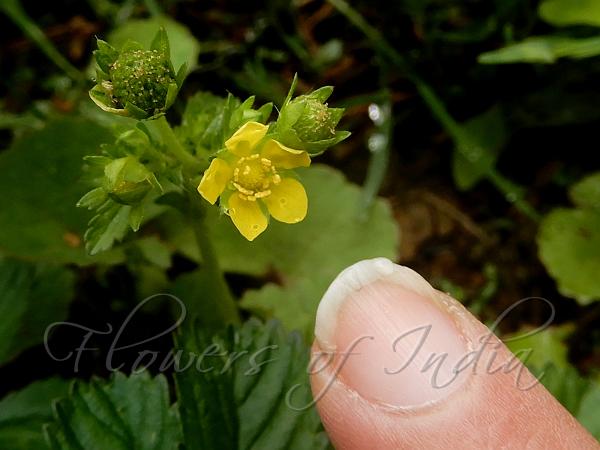|
| Five-Leaf Cinquefoil |
|

|

| File size | 428711 |
| Original date | 7/10/19 1:27 PM |
| Resolution | 2000 x 1500 |
| Flash | Flash did not fire, auto |
| Focal length | 4.3mm |
| Exposure time | 1/125s |
| Aperture | 3.4 |
| Focus Distance | |
| Metering Mode | Center weighted average |
| Camera make | NIKON |
| Camera model | COOLPIX A900 |
| Sensor type |
|
|
|
|
Photo: |
Botanical name: Potentilla sundaica Family: Rosaceae (Rose family)
Synonyms: Potentilla kleiniana, Potentilla reptans var. trifoliolata, Fragaria sundaica
Synonyms: Potentilla kleiniana, Potentilla reptans var. trifoliolata, Fragaria sundaica
Five-Leaf Cinquefoil is an annual, biennial or
perennial prostrate herb with small flowers, arranged in many flowered,
branch-end cymes, 6-8 mm across. It is named for Sunda Islands near
Indonesia, where it was probably first found. Petals are small, 3-3.5
mm long, yellow. Sepals are sparsely hairy, outer sepals oblong-ovate,
blunt, entire or divided, inner a little longer, ovate, pointed.
Stamens are about 20. Carpels numerous, attached on the swollen, nearly
hairless receptacle. Stem is prostrate at the base, velvet-hairy.
Basal leaves are 5-fold digitate, leaf-stalks slender, 5-25 cm. long,
hairy. Leaflets are obovate-wedge-shaped, 1.5-3 cm long, 15-25 bluntly
sawtoothed-toothed, upper surface sparsely hairy to hairless, lower
surface adpressed hairy usually on the veins. Achenes are small,
ridged. Five-Leaf Cinquefoil is found in the Himalayas, from Kashmir to
NE India, Western Ghats, Ceylon, China, Java, at alitudes of 1000-2200
m.
Medicinal uses: The plant is astringent,
depurative and febrifuge. The whole plant is decocted and used in the
treatment of colds, influenza, sore throat etc.
The plant is astringent,
depurative and febrifuge. The whole plant is decocted and used in the
treatment of colds, influenza, sore throat etc.
Medicinal uses:
 The plant is astringent,
depurative and febrifuge. The whole plant is decocted and used in the
treatment of colds, influenza, sore throat etc.
The plant is astringent,
depurative and febrifuge. The whole plant is decocted and used in the
treatment of colds, influenza, sore throat etc. | Identification credit: Tabish | Photographed in Ukhrul district, Manipur. |
• Is this flower misidentified? If yes,